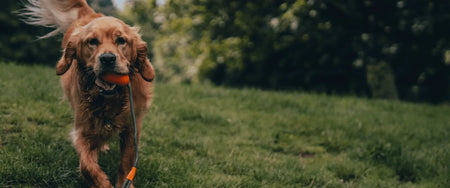One of the most important things to do when you first get a puppy is to get them vaccinated with the appropriate jabs. Just like us humans, dogs need them to stave off potentially harmful illnesses and diseases. Your puppy will require a range of different vaccinations, and at different stages. In this piece, we’ll be exploring the type and the timing of vaccinations your puppy will need. First, though, how do vaccines work?
How Do Puppy Vaccinations Work?
Puppy vaccinations work in much the same way that regular human vaccines do; that’s to say, by administering a small dose of the pathogen (disease-causing organism) in question, which in turn triggers an immune response within your dog. What this means, in practice, is that, should your dog be exposed to that pathogen in the future, then they’ll already have a learned immune response ready to use to ward it off, or at least lessen its impacts.
Which Vaccinations Does My Puppy Require?
Generally speaking, your puppy needs to be vaccinated against six primary diseases. These are as follows:
Canine parvovirus
Leptospirosis
ICH (Infectious canine hepatitis)
Canine distemper virus
Parainfluenza
Kennel cough (optional)
Canine parvovirus
Also often simply known as ‘parvo’, canine parvovirus (CPV) is one of the deadliest diseases faced by dogs, and one of the most important to vaccinate against. Stemming from a virus, CPV can be either intestinal or cardiac, with both leading to symptoms including: vomiting, lethargy, diarrhoea, fever, and sadly, often death.
CPV is transmitted through a dog’s faeces, and is passed onto another dog through ingestion of that faeces. In vaccinated dogs, treatment has a success rate of between 85% and 90%, however for unvaccinated dogs, mortality rates can push upwards of 90%, showing the importance of getting your dog vaccinated. CPV is usually protected against with the DHPP vaccine. This stands for Distemper, Hepatitis, Parainfluenza, Parvo.
Leptospirosis
More commonly known as ‘lepto’, leptospirosis (also known as Weil’s Disease) is a bacterial infection typically transmitted in rats and cattle. The Leptospira bacteria affects a dog’s kidneys and liver, and can survive for long periods of time in moist soil/stagnant water, and this is where dogs will usually pick up the disease, or when they come into contact with infected urine from another lepto-carrying animal.
The common symptoms of lepto include: loss of appetite, vomiting, lethargy, increased urination, jaundice, and occasionally, bleeding. If left untreated, lepto can quickly become fatal. Mortality rates from lepto depend on at which stage the disease is caught and treated, so early intervention is crucial.
It’s important to note that even vaccinated dogs can still get diseases such as lepto (the efficacy of some vaccines is naturally lower for some dogs) and so if you’re in any doubt about your dog’s wellbeing, even if they’re vaccinated, get in touch with your vet. Leptospirosis is protected against with the Lepto vaccination, often known as L2 or L4 – this is typically manufactured by Nobivac or Eurican.
Canine distemper virus
Canine distemper virus (CDV) is a virus which is spread via airborne transmission, as well as through bodily secretions, and causes a wide range of nasty symptoms, which include: tremors, fits, coughing, lethargy, and both a runny nose and watering eyes. Fortunately, it’s not that common anymore, however the best bet against your dog catching it is through vaccination. CDV is immunised against using the DHPP vaccine.
Infectious canine hepatitis
Another nasty disease, infectious canine hepatitis (ICH) is highly contagious, and has symptoms which range from the relatively mild to the very severe, and even fatal. The most common symptoms of ICH include: abdominal pain, jaundice, vomiting and diarrhoea, lethargy and more.
There are two main variants of ICH, one which is more similar to human hepatitis, and stems from a liver infection, and another which has symptoms more similar to that of kennel cough. ICH is also known as canine adenovirus, and can be spread by virtually all bodily excretions. Like parvovirus and distemper, ICH is protected against using the DHPP vaccine.
Parainfluenza
Also known as CPiV (canine parainfluenza virus), this nasty virus affects a dog’s respiratory system, and is related to canine distemper (CDV), with both belonging to the broader Paramyxoviridae. Symptoms of CPiV include: dry coughing, moist coughing, loss of appetite, fever and lethargy. Immunity against CPiV is gained using the DHPP vaccine.
Kennel cough
Kennel cough isn’t quite so important for your puppy to be vaccinated against, when compared with the previous four diseases/viruses, however it’s worth vaccinating against if you envisage that you’ll be putting your dogs into kennels at any point – if you go on holiday, for instance. Kennel cough is protected against with the Bordetella vaccine. Unlike other vaccinations, the Bordetella vaccine is administered nasally (the dose is squirted into your puppy’s nose).

When Should I Get My Puppy Vaccinated?
The next important question pertains to your puppy vaccines schedule. Generally speaking, puppies are vaccinated between eight and ten weeks old. Once your puppy has had its first vaccine doses it will need to come in around four weeks later for a second dose.
Beyond this, they’ll then need booster vaccinations annually to help ‘top up’ their immunity. If you want to get your puppy vaccinated earlier than the eight to ten week mark, then this is something you’ll need to consult with your veterinarian; in some cases they might be able to accommodate such a request.
Usually, the second dose will be the same vaccine brand as the first, but it doesn’t have to be necessarily, so don’t panic if you see a different label or sticker on your vaccination record the second time around.
When Can a Puppy Go Outside?
As a rule, it’s advised that you don't take your puppy out before it’s had its second dose of vaccinations, and even then to potentially wait a week or so after this to allow greater immunity to build up. If you take your puppy out in public places prior to this, then they’re at a much greater risk of picking up one of the diseases mentioned above, as they won’t have built up an immunity at that point.
A puppy will receive some initial immunity from the antibodies within its mother’s milk, however this wanes relatively quickly, and never develops into that strong of an immunity, especially when compared with the protection provided by vaccinations.
None of this is to say that you can’t let your puppy out whatsoever; you can obviously let your pup out into the garden (under supervision) to do his/her business, however you don’t want to be taking them out on walks, or anywhere where they might come into contact with other dogs or animals.
Can My Puppy Get Parvo From My Backyard?
Parvo is one of the diseases most owners worry (and know) about when they first get a puppy, and it’s not surprising to see why given how devastating it can be. You can never rule out that parvo won’t make it into your garden, but your dog is far less likely to pick it up there than it would at the local dog park, say. It would be cruel not to let your puppy have any time outdoors, so you can let your puppy into the backyard, just be sure to keep an eye on your pup as you do.
Are there other Optional Vaccinations My Puppy Can Have?
Besides the primary diseases you’ll want to protect your puppy against with your schedule for your puppy’s vaccines, there are also other less common (though still nasty) illnesses you might want to consider inoculating against. The main one of these (aside from the kennel cough Bordetella vaccine) is the rabies vaccine.
Rabies
Rabies is a virus that’s (usually) transmitted through animal bites, with symptoms of rabies including: seizures, sensitivity, muscle weakness and excessive drooling. Rabies vaccinations are necessary if you plan on taking your dog abroad.
How Expensive are Vaccinations?
This will depend from vet to vet, however as a rule of thumb, one round of vaccinations will look to set you back somewhere between £40 and £70. This will most commonly cover DHPP and Lepto (meaning that parvovirus, distemper, leptospirosis and infectious canine hepatitis are protected against). The Bordetella vaccination against kennel cough will usually be additional to this.
What if My Vaccinations are Overdue?
You’ve had your puppy vaccinated, and an uneventful year passes, but then another few months pass before you realise you’ve forgotten to get your pup its booster jabs. In this scenario, what you do depends on how overdue the vaccinations are.
Most vaccine manufacturers state that there’s a three month leeway period after the next vaccination due date, in which your dog will still likely have strong immunity, and a single booster dose will suffice.
Any longer than this, however, and it’s recommended that you restart a new 2-dose course of treatment (four weeks apart, just as in the first year of your puppy’s life) to reinstate that higher level of immunity and cover all bases.
Final Thoughts on Recommended Puppy Vaccination Schedule
Most dog owners breathe a big sigh of relief once their puppies have been vaccinated, knowing that they’re much safer than they were pre-jab.
If you have any concerns about your puppy’s vaccinations, or about his/her health and wellbeing more generally, then don’t hesitate to get in touch with your veterinarian. They perform vaccinations day in and day out, so they’re used to fielding questions on side effects, cost, how to calm your dog, and more.
Whether your puppy likes it or not, however, they’re going to have to get their vaccinations, so if you’ve not had them done yet, and they’re of the right age, then we’d recommend getting your puppy vaccinated as soon as possible.











